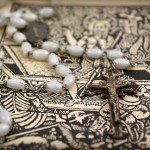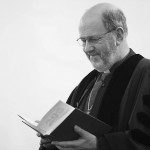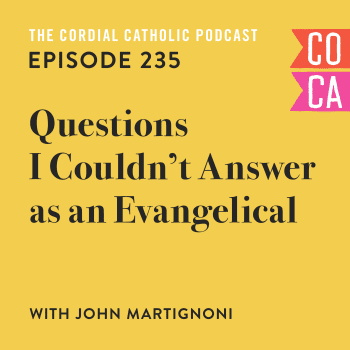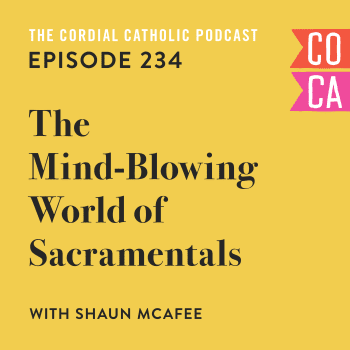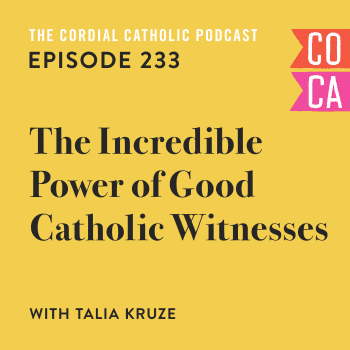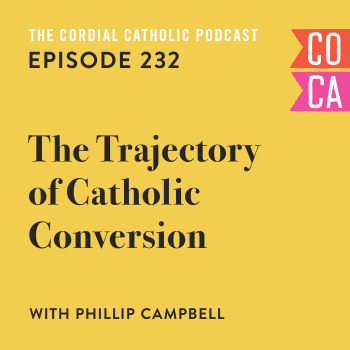
As a Protestant fully on his way to a Catholic conversion one of chief sources of answers to questions commonly asked—and a major catalyst for my conversion—has been reading the conversion stories of fellow Protestants. Us Protestants, as we begin to explore Catholicism, wind up asking a lot of the same questions, running into a lot of the same problems, and finding ourselves up to our necks in the same sort of difficult situations. Conversion stories are a comfort and an education, and I’ve read a lot of them.
Among the most profound—maybe the most profound—story that I’ve read has been G.K. Chesterton’s The Catholic Church and Conversion. Chesterton is an incredible writer and rhetorician and responsible for C.S. Lewis’s own conversion to Christianity. Chesterton and Lewis share a similar wit, finesse, and intellect. Chesterton’s own story of conversion is profound and although his autobiography is certainly more autobiographical than The Catholic Church and Conversion the latter is an incredible treatise on the struggles and journey of the convert on their way to conversion.
I’ve added it to my must read list under the Resources section and I’d like to write more about it, and quote it at length, but that’s for another time (or times).
What’s more profound though, upon reflect, is the common thread running through the stories of Protestant coverts to Catholicism. A thread certainly picked up on, and expounded upon, by Chesterton but a common thread amongst converts all the way back to the days of the Reformation when St. Francis de Sales, a Catholic priest, brought European Protestants back to Catholicism. This common thread runs from St. Francis through to Chesterton through to Scott and Kimberly Hahn, Steve Ray, Michael Cumbie, all the way through to myself, and the Protestant converts that I’ve met, too.
It’s a common thread that, when tugged, seems to unravel a Protestant’s worldview quite completely.
Protestants don’t understand that Catholic Church. When we do, that is when things begin to unravel. That is the common thread.
In the stories of the European masses in the 16th century, in the story of Chesterton, in the stories of Scott and Kimberly Hahn, of Steve Ray and his wife, of Michael Cumbie and his, of the friends I’ve met, of myself it is the same common thread. It begins by understanding the Catholic Church.
It begins by honestly, intellectually and spiritually exploring the Catholic Church. Now, of course, it doesn’t begin this way for everyone but it began this way for me and all those I’ve mentioned above. It began, for us, as an exercise in exploring what Catholicism was saying. As Protestants in 16th century Europe, as a Protestant in 20th century England, as Protestants in 1980’s American, and as a Protestant at the tail end of 2014 it’s the same story, the same thread: We held certain beliefs, certain ideas, about the Catholic Church and when we began to honestly, earnestly explore the actual claims, beliefs, and ideas of the actual Catholic Church we found that we were sorely mistaken.
And we couldn’t believe what we missed.
See when St. Francis de Sales set out to reconvert the Protestant masses back to Catholicism during the Reformation what he did was to explain to those Protestant masses what Catholics actually believed.
When Chesterton, as an Anglican, began to take the Catholic Church seriously his conversion began in earnest when he began to read Catholics, when he began to learn what Catholics actually believed.
When Scott Hahn, a Calvinist and professed anti-Catholic began to seriously study what Catholics actually believed he found himself rapidly and wholly consumed with the Catholic faith—a consuming passion and pursuit that cost him his job and his academic career at the time.
When I decided to learn about Catholicism so I could better understand and express what I believed as a Protestant—when I began to learn what Catholics actually believed—I found myself inexplicably drawn to the Church, and on the path to serious conversion.
The thread is impossible to miss.
We Protestant converts didn’t understand the Catholic Church. We thought we knew what Catholics believed and when we began to explore we not only found out that we were sorely wrong, we found out that they were so right we wanted to join them.
Michael Cumbie, who I mentioned earlier, was a former evangelical pastor who made a stunning conversion to the Catholic Church. Cumbie is extraordinary. A Southern Baptist preacher who then became a charismatic Pentecostal Cumbie takes on the self-described title ‘evangelist’ with gusto. He’s exactly what you’d picture an evangelist to be, complete with cheesy jokes and boisterous laughter. He’s an incredible gift to the sometimes stuffy Catholic parishes that I’m sure he frequents on his missionary tours.
Like a true evangelist, however, Cumbie is bold and on the numerous interviews and lectures I’ve watched he repeats one very bold claim.
“If I could explain to you why what you believe about the Catholic Church is wrong and what the Church really believes,” Cumbie says, “You’d become a Catholic.”
I don’t make a claim as bold as Cumbie’s, but I don’t fault him for making it.
Not everyone has the common thread of conversion in their lives. Not everyone who begins to understand what Catholics actually believe will become a Catholic. If that were the case everyone who reads Scott and Kimberly Hahn’s Rome Sweet Home would become a Catholic, and they don’t. But thousands, maybe hundreds of thousands, do and have as a result of that book and lecture series.
If there was a bulletproof reason to become Catholic then we’d all be Catholic, but there isn’t, and people don’t write books about “that time I read a lot of Catholic theology but didn’t become a Catholic.”
What there is is a common thread running through all the stories of those that did convert. The common thread is beginning to learn what Catholic actually believe. The truth is incredible. The truth about what Catholics believe has left me speechless with excitement, trembling with anticipation, and bubbling up inside with joy. The truth is a world of faith larger on the inside than I ever could’ve possibly imagined from the outside. The truth is this enormous, amazing, all-encompassing thing that I cannot but breathlessly share with you, inch by inch.
The common thread amongst us Protestant converts, or at least the one’s I know, is that we had a certain picture of the Catholic Church. The picture was of an old, dusty, and irrelevant church. The picture was something hung up, maybe, in our grandmother’s bedroom. Our picture of the church included all this stuff that it had collected over the years—all these things the Catholic Church did that amounted, in our minds, to superstition, ceremony, and idolatry.
The common thread amongst the Protestant converts that I’m talking about, myself included, is that once we begin to dust off that picture, once we take it down off the wall and honestly study it even a little bit more closely we see that it isn’t what we thought—it’s nothing damn near what we thought—it’s a complete masterpiece. Granted, if we’re honest, it needs some work around the edges, it’s utterly beautiful.
Once we Protestant converts began to learn what Catholics actually believed we came completely, wholly, undone.

